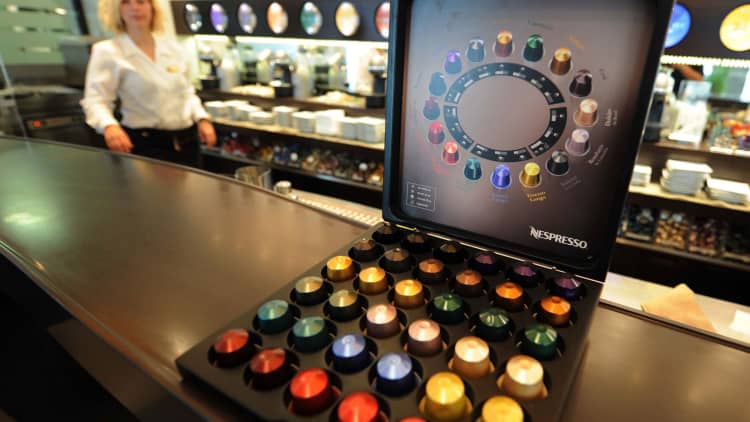[ad_1]
Cafes de Colombia Expo, the most important specialty coffee fair in Latin America, takes place in Bogota, Colombia on October 20, 2023.
Anadolu | Anadolu | Getty Images
You might have seen yet another influencer coffee brand launch on social media, have noticed your colleagues making their own drip coffee in the office kitchen rather than using the machine, or even seen lines form at your local independent coffee shop.
Whatever way, it’s clear that coffee drinking has become a trend, something more than just getting a caffeine hit.
“With drinks and snacks becoming must-have items with cool currency, coffee has become a steady go-to as a vehicle for affordable luxury and lifestyle expression,” Claire Lancaster, head of food and drink forecasts at consumer and product forecasting company WGSN, told CNBC.
“We’ve seen a trend over time towards premiumization,” she explained, adding that this has been reflected in a growing preference for higher quality coffee, both in how it is brewed and where it originates from, as well as different types and flavors.
The Bean Shop, an artisan coffee roastery in Scotland that offers online ordering, has noticed a surge in customers.
“There has a been a big increase in people making speciality coffee at home,” one of it’s owners, Lorna Bruce, told CNBC. “People love to try something new.”
Elsewhere, AeroPress, a company that produces popular coffee makers, told CNBC that it has seen sales increase, as well as a “dramatic” rise of interest from second-party retailers. In the past year, the company has gained two major retail partners including Walmart, Chief Marketing Officer David Cole told CNBC.
As consumers pick up new ways of brewing, they continue buying the necessary accessories like filters, Cole added.
In the U.K., AeroPress sales between December 2022 and December 2023 grew by 40%, and the company now distributes its products to over 400 retailers like roasters and small coffee shops, a company representative said.
Besides AeroPress, other popular coffee-making methods include pour-over or drip coffee makers (like V60s or Chemex coffee makers) as well cafetières and moka pots that boil coffee on the hob.
Many of these methods are historically popular in certain regions, like cafetières in France and moka pots in Italy, but have recently gone global.
How coffee became cool
But how did coffee go from a standard, easily accessible caffeinated drink to being a major trend? Well, the Covid-19 pandemic and resulting lockdowns appear to be one reason.
“Lockdown meant people took the time to make the drinks that they’d normally get on the go,” the Bean Shop’s Bruce said.
“Customers tell us that they ‘can’t drink supermarket coffee now’ and they have gotten used to the freshly roasted flavors and aromas you get when coffee is brewed within a couple of weeks of roasting,” she added.

Consumers also appear to value small things like coffee drinking more now, Melanie Birnbaum, chief brand officer at Nespresso, told CNBC.
“Recent years have reaffirmed the value in simple pleasures and little luxuries like a cup of coffee,” she said, adding that this has prompted consumers to seek out higher quality produce.
“At the same time, some of the creativity and sense of exploration is being driven by social media, where new and inventive recipes are shared on TikTok,” she added.
WGSN’s Lancaster has also identified social media as a key driver of coffee’s coolness.
“Gen Z and TikTok are shaping coffee culture,” she said, pointing out that certain hashtags like #CoffeeTok have grown significantly in the past year.
There is also some overlap with the pandemic. For example, trendy coffee drinks like the Dalgona coffee (which involves whipping coffee powder, water and sugar to create a cream-like substance before adding milk) went viral on social media in 2020.
Coffee trends ahead
Social media is also a driver behind some of the trends that are on the horizon for coffee, Lancaster noted, as brands gain traction there if they have a “cool” element to them — and new coffee-making methods are shared frequently.
Another key trend ahead is coffee with add-ons that are designed to boost wellbeing and health, Lancaster pointed out. This has even reached large companies like Nespresso, which has launched blends enriched with Ginseng or vitamin B12 – or “functional coffee” as Birnbaum calls it.
“Some people are looking for something extra in their day,” she said. “These blends have added wellbeing benefits like vitamins or extra caffeine.”
Other growing trends include specific coffee styles being exported from their traditional markets, like Vietnamese coffee, made with condensed milk, and Indonesian Kopi coffee, which is based on partially digested coffee cherries, Lancaster explained.
And of course, innovations to at-home brewing devices and technologies aren’t going anywhere either, Lancaster added.
[ad_2]
